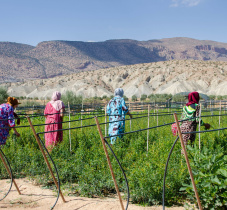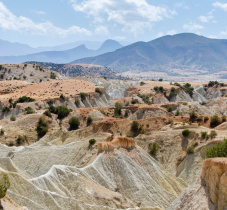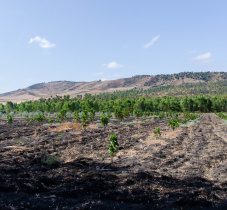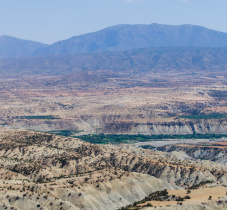Project description
Help restore endemic keystone species that will provide healthy habitat structures and re-establish resilient agroecosystems in the Taza region.
The project at a glance
- Number of trees to be planted: 400 000 trees in two years
- Species planted: Carob tree, fig tree, cherry tree, olive tree, pomegranate tree, almond tree
- Planting period: November to Mars
Context of the project
In Morocco, climate change and the hazards it causes considerably weaken the agroecosystems in the north-western part of the country. In this region known for its arboriculture, agricultural practices also contribute to deteriorating soils and polluting ecosystems. In addition, the COVID-19 pandemic has had a dramatic impact on the livelihoods of small independent farmers, most of them relying on seedlings and fertilizers usually supplied by large international companies.
Today, the major challenge is to restore Taza's agroecosystems, through the planting of trees. An approach that will help empower farmers and stabilize their production. This will thus allow them to face future crises, such as the COVID-19 pandemic.
To do this, 400,000 trees are planted over two years. This approach will help meet the objectives set by the Moroccan Ministry of Agriculture, which plans to plant one billion trees to alleviate the systemic poverty that plagues Moroccan rural communities. The planting of fruit trees will revitalize agroecosystems and further develop fruit production by planting species native to the region.
The project is supported by Reforest'Action and carried out on site by the High Atlas Foundation in collaboration with the Moroccan Department of Water and Forests. Ultimately, it will contribute to the resilience of the ecosystems as well as the economic development of the local populations.
The project
Plants and seeds, purchased from local producers, are grown and treated with organic products in local nurseries. The cultivation, monitoring and harvesting of the seedlings are done by local community members with the support of HAF.
The planting sessions are carried out collectively by the inhabitants of the region. In total, 400,000 fruit trees are planted between 2021 and 2023 to generate new sources of income for local producers. The profits generated will also finance community projects identified by local associations and cooperatives.
The trees planted are native to the region: carob, almond, olive, cherry, fig, pomegranate etc.
Benefits
The species planted, chosen for their capacity to resist the region's climatic conditions as well as the hazards due to global warming, will:
- Enrich the soil and prevent erosion
- Retain water and preserve natural water sources
- Attract pollinating insects, which are essential to the health of the various ecosystems and crops.
Economically and socially, this planting project will :
- Provide new sources of income for local producers, helping to improve the quality of life of tens of thousands of families in the region
- Help local communities achieve a degree of autonomy sufficient to stabilize their production and face possible new national or global crises.






